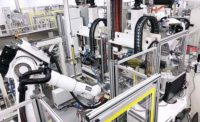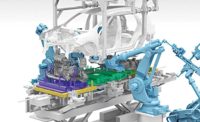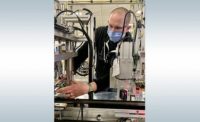Swiss Solar Module Manufacturer to Build U.S. Assembly Plant
Meyer Burger Technology AG, a manufacturer of solar modules based in Thun, Switzerland, is planning to build its first U.S. assembly plant.
Meyer Burger is reviewing a list of possible locations in several U.S. states, and the company expects to make a decision by the end of 2021. The criteria for choosing a location include available buildings, regulatory and tax considerations, state and local economic development programs, available qualified workforce, proximity to transport infrastructure, the supply of renewable energy, and the commitment of local communities.
The company’s decision to expand to the U.S. is driven by a strong domestic solar market and positive economic policies for clean energy. Meyer Burger wants a U.S. plant so it can assemble modules as close as possible to its customers, create a more sustainable supply chain, and provide greater flexibility and faster delivery times.
The factory will assemble solar modules for residential rooftops, commercial roof systems and solar power plants. Initially, the plant is expected to produce enough modules annually to generate 400 megawatts of electricity, but it could someday be expanded to make enough modules annually to generate several gigawatts of power. Production is expected to begin at the end of 2022.
“Meyer Burger is very pleased to expand production in the USA,” says CEO Gunter Erfurt. “The United States has a long history in the solar industry. In the 1970s, the world’s first production facility for solar modules was built in California—well ahead of Europe and Asia. Now is the time to get back to the roots of the industry and help end [the country’s] reliance on imports from abroad.”
Battery Manufacturer Airlifts Assembly Line to Leapfrog Port Congestion
In August, Enovix Corp., a manufacturer of lithium-ion batteries for portable electronics, completed installation of a new automated assembly line at its factory in Fremont, CA.
It almost didn’t happen. The line was designed and built in Asia, and the congestion gripping West Coast ports this year would have delayed delivery by months.
Since that was not an option, Enovix and its logistics partner, TransPak, opted to transport the line to the U.S. by air. But, just any wide-body cargo plane, such as a Boeing 777 or 747, wouldn’t do. Rather, the job went to Ukrainian-based Antonov Airlines and its An-124, a super-jumbo cargo jet that was originally designed to carry tanks for the Russian military.
“We were faced with a choice: Accept a three-month delay [in] the startup of our factory…or try to find some creative way around the backlog,” says Enovix chief operating officer Cameron Dales.
The automated assembly line consists of more than 25 machines and robots that work in unison. The total shipment weighed 55 tons. After undergoing extensive testing, the line was partially disassembled and carefully packed into 60 shipping crates before being loaded on the An-124, which delivered it to San Francisco International Airport on a Sunday in late April. With a length of nearly 230 feet, two internal cranes and front-and-rear ramps, the super freighter is well-suited for oversized cargo.
Most of the units arrived at the Fremont facility on flatbed trucks within hours of landing. One piece was so large it required an escort by the California Highway Patrol the next day.
The air charter “certainly involved premium pricing relative to other modes of transportation, but from an ROI perspective it was kind of a no-brainer for us. The time was just so valuable,” says Dales.
Enovix is a case study in how companies are going beyond traditional logistics tactics to keep their businesses running in the face of supply chain delays. As of Sept. 21, some 65 container ships were waiting to enter the ports of Los Angeles and Long Beach, a record number. Cargo is piling up in terminals faster than trucks and trains can move it out.
The Enovix factory is the first facility in the world capable of volume production of advanced lithium-ion batteries with a special 3D architecture called a silicone anode that offers up to 110 percent improvement in energy density compared to standard batteries for mobile applications. At full capacity, the factory is expected to assemble 45 million batteries per year.
Battery Assembly Plant Coming to South Dakota
AEsir Technologies, a manufacturer of nickel zinc batteries for aerospace, defense and data center applications, has selected Rapid City, SD, for a factory complex that could eventually employ 1,500 people.
AEsir Technologies plans to construct four buildings. The first building will be a 150,000-square-foot manufacturing and distribution center capable of producing 1.2 million batteries annually.
The company initially plans to hire 400 employees and expand to 1,200 to 1,500 employees. The first phase will cost around $90 million with a total price tag of $300 million when all four phases of the development are finished.
Rapid City beat out 20 other cities for the project, including San Antonio, Bozeman, MT, Charlotte, NC, Wichita, KS, and Tucson, AZ.
AEsir Technologies’ nickel zinc batteries are two to three times more powerful than lithium ion batteries and last just as long. The batteries use potassium hydroxide as the electrolyte, an active ingredient in soaps and shampoos, which makes the batteries environmentally friendly.
GE to Build Turbine Blade Factory in UK
GE Renewable Energy is building a factory in Teesworks, UK, to produce the massive blades for its Haliade-X offshore wind turbines. Each blade is 107 meters long.
Hiring for the plant is scheduled to begin in mid-2022, with an estimated 750 jobs to be filled. An additional 1,500 indirect jobs are expected to be created to support the supply chain for the factory.
When production starts, the factory will initially produce blades for the Dogger Bank offshore wind farm, a group of offshore wind farms under construction 78 to 180 miles off the east coast of Yorkshire, England, in the North Sea. The development will consist of three offshore wind farms, each with a combined capacity of 3.6 gigawatts, enough to power 6 million U.K. homes.
2000
Number of Tesla Megapacks ordered in September by Arevon, a renewable energy company based in Scottsdale, AZ. A Megapack is a stationary energy storage system consisting of rechargeable lithium-ion batteries. About the size of a standard intermodal shipping container, each Megapack can store 3 megawatt-hours of electricity. Megapacks are used to store energy generated by intermittent renewable power sources, such as solar and wind. The systems are produced at Tesla’s Gigafactory 1 in Storey County, NV.









